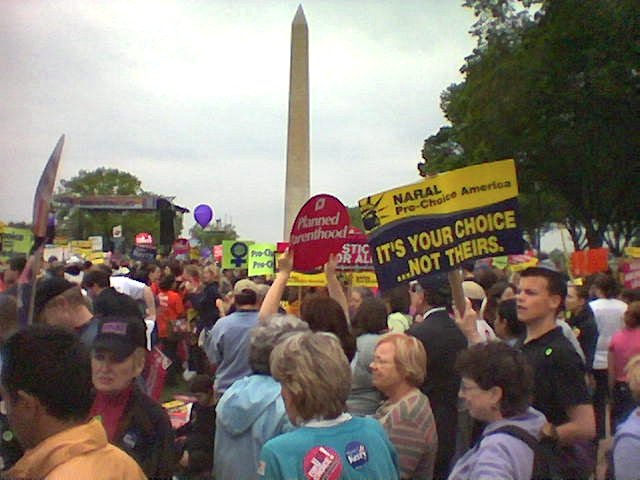
As a human female who enjoys activities such as having rights and dignity, I am becoming increasingly alarmed by the full-fledged assault on abortion access in the United States.
The choice to terminate a pregnancy in the U.S. is not available to all women:* it depends on your geographic location and your resources. For poor women, women of color, and young women, access to abortion can be extremely limited, and this situation is only getting worse.
In March, the Supreme Court will hear oral arguments for Whole Women’s Health v. Hellerstedt, a case that could allow states to effectively ban abortion by imposing impossibly stringent restrictions. Legislatures all over the country are determined to strip women of their right to obtain reproductive health care such as cancer screenings and birth control by defunding Planned Parenthood. Presidential candidates are gleefully discussing outright outlawing abortion, as if this is not a constitutionally protected right. Many women are self-inducing abortions because clinics have been closed.
This is terrifying.
I am a firm believer that there is no such thing as a fair and just society where some or all women cannot control the number and spacing of their children. As a woman, I am tired of feeling like my body is a battleground. I want to encourage readers who support abortion rights to be upfront and unabashed in that support if we want to win this fight. There are many ways in which we must do this, but I’d like to focus on a dangerous trap people often fall into: drawing distinctions between women seeking abortions who are victims of rape, and those who aren’t.
We use whether or not a conservative candidate supports abortion in cases of rape as a litmus test for how extreme they are.
We often use questions like, “what if she was raped?” as a way to find common ground with those who generally oppose abortion. Among those advocating for reproductive rights, there is the prevalent view that if we can’t secure abortion rights for everybody, we should at least get them for victims of rape. The implication is that surely a rape victim, who didn’t consent to sex, shouldn’t be forced to carry a child to term.
It seems like a good idea, but also reinforces the ideas that we are trying to fight.
It’s counterproductive. Nobody should be forced to carry a child to term. People who support abortion only in cases of sexual assault are suggesting that women who have sex voluntarily deserve to have an unwanted pregnancy: that childbearing is a fitting punishment for sluttiness. This is a very problematic idea and those of us who want to defend women’s rights cannot pander to it.
If abortion actually is morally wrong because of what it does to a fetus, then the woman’s actions should be irrelevant.
A person against abortions willing to make an exception in cases of rape or incest is essentially stating that the real wrong is not abortion, but consequence-free consensual intercourse: after all, that is the only difference between an “immoral” abortion after voluntary sex and a “justified” abortion after a rape. While I find those who oppose abortion in all cases to be misinformed and dangerous, they are at least being internally consistent.
People have a right to sexual expression and also have a right to decide if and when they want to become parents. However, a small but vocal group of anti-choice individuals have so captured our national attention that we have allowed the idea of a woman who has sex voluntarily and needs an abortion (maybe her contraception failed, maybe her anti-choice politician ensured she didn’t have sex education and so she didn’t use any) to become extremely stigmatized.
This stigma is evident in many ways. I have caught myself whispering the word “abortion” in public conversations, as if it were inappropriate language. People defend Planned Parenthood against attacks by pointing out that only 3% of their services are abortion-related and that no federal funding goes towards abortion. That may be the most effective defense in our political climate, but it implies that there is something wrong with abortion.
Abortion is a social good: society is better and happier when children are cared for and people aren’t forced to carry pregnancies they don’t want.
Children should be viewed as gifts, not as consequences we must face. Many of us believe this, but we contradict ourselves when we act like women seeking abortions who voluntarily had sex are less deserving. This current wave of anti-abortion hysteria is about punishing women and putting them in their place. It’s about telling women who have sex they should be prepared to become mothers. If they didn’t want to be a mother, well, hey, they should have kept their legs shut. And, as many women actually enjoy sex (what a surprise!) it is meant to reinforce the idea that a woman’s proper role is maternal.
If politicians wanted to actually stop abortion, everyone would have adequate contraceptive options and sex education, and we’d have a social safety net that would allow people to actually support their kids.
There is no room for gender equality in this worldview. Heterosexual women shouldn’t be asked to sacrifice their sexuality in order to have a career or financial security or simply not become a parent. Heterosexual men, unlike women, have generally not been asked to abstain from sex in order to avoid having children or maintain a career. We must eradicate this double standard in which any woman who has sex must be willing to carry a pregnancy to term. You don’t have to have been violated to be a good person seeking an abortion.
When we separate women into categories like this, we are acquiescing to the misogynistic perception that there is something inherently wrong with a woman who would voluntarily have sex for the purpose of pleasure or intimacy and not of creating children. We are implying that a heterosexual woman who wants to remain childless must kiss her sex life goodbye until menopause or hope her birth control (assuming she has access to it) never fails her.
We are demanding that rape victims go before police officers and judges (who are frequently male) and properly demonstrate how nonconsensual their sex was before they can finally take control of their body, a thought that should make us all shudder: remember, we live in a world that likes to draw distinctions between different types of rape, using scholarly terms such as “rape-rape” and “legitimate rape.” Also, remember that a world that shames women for having consensual sex will never be a world that takes rape victims seriously, because that’s the type of world that likes to ask questions like “what was she wearing?” and “had she slept with him before?”
This current assault on reproductive rights is out of control, and is buttressed by the notion that there is something shameful and wrong with women having sex. We therefore cannot make concessions in our language. We cannot continue to be complacent with the shaming of ordinary women seeking abortions. If we believe that all women (no matter where they live, how much money they have, or how they became pregnant) deserve access to abortion, our words must reflect that.
*Author’s Note: Not all people seeking abortions are women, (for example, trans men seek abortions), but this piece following the national dialogue focuses on women.
Author: Olivia P. Rich
Editor: Renée Picard
Image: Wiki Commons






Read 3 comments and reply